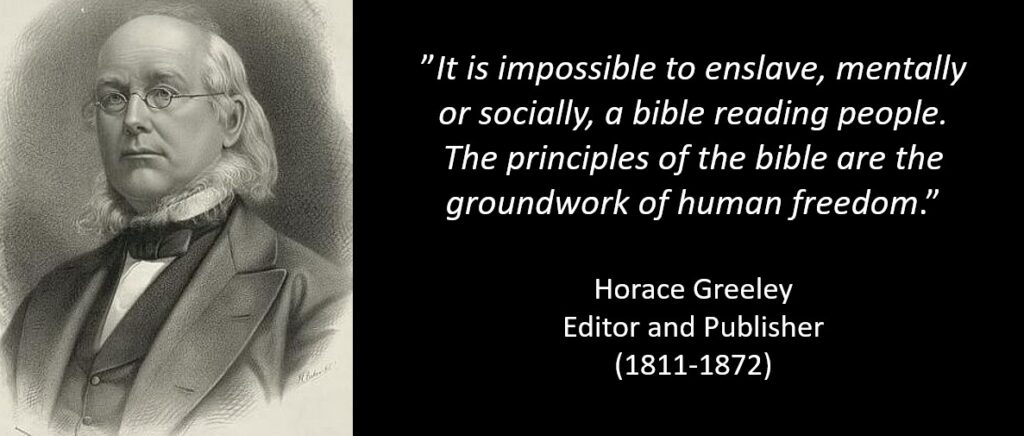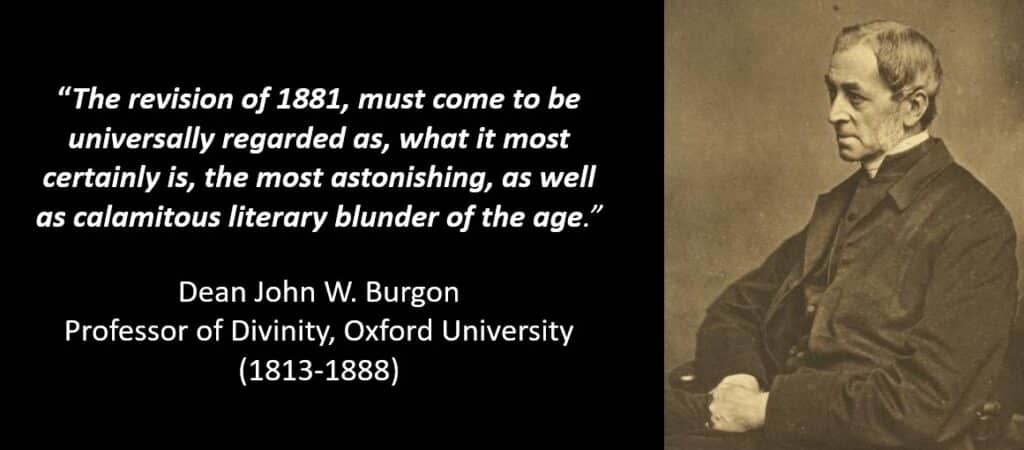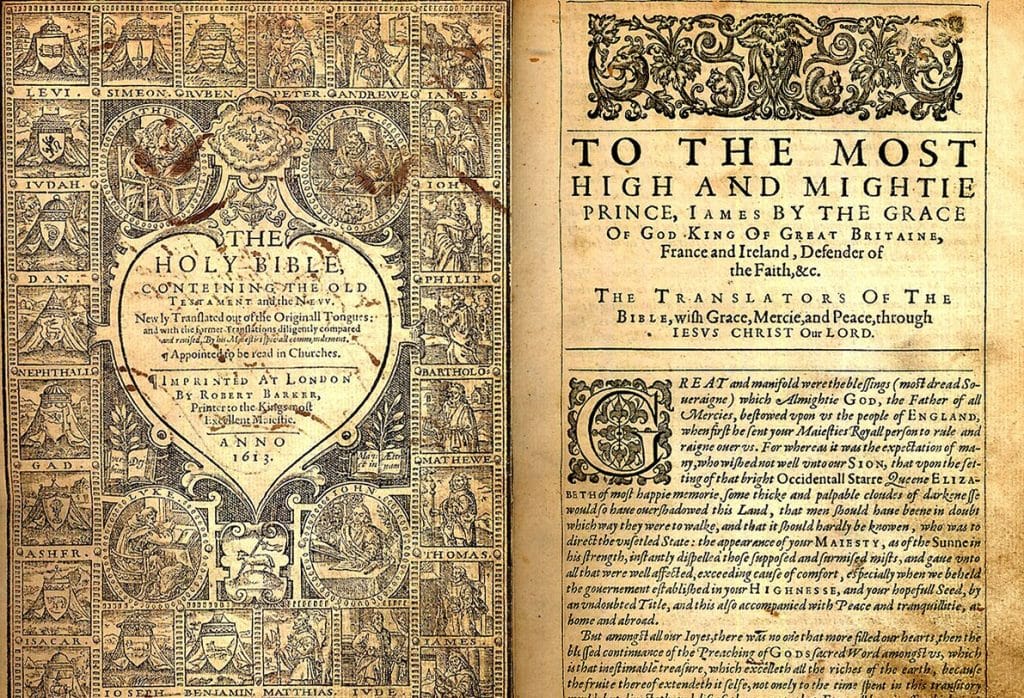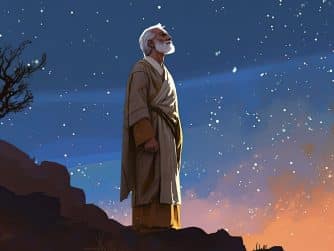What I’m about to share with you in this article might appear controversial on the surface, but trust me, I’ve done the research. Whenever someone mentions ‘the Bible’ in passing, they’re usually referring to the King James Bible (KJB). When God sanctioned His Holy Writ, to be etched on tablets of stone, papyrus, parchment, and finally codex, it would eventually wind up as the paragon of all translations, in the Elizabethan prose of the KJB. It was during the early 17th century; the English language had reached its full cogency. Each word was broad, simple and generic.
In the past 300 years, several words are now necessary to convey the same meaning that one word contained. God’s timing for the publication of the KJB was perfect. Now before you start complaining about the archaic pronouns and how the Elizabethan English is hard to understand, realize that whenever a bible version, has the terms ‘new’ or ‘revised,’ it has been modified in some way from the original text. At the end of the article, I will reference the splendid work by David Daniels (with his permission). He has taken the time to document key omissions and revisions made by literally every modern English version (forty-one in total). This will be your homework.
Biblical illiteracy in our day and age
Ever since the serpent questioned God’s word in the Garden of Eden, ’yea, hath God said?’ (Gen 3:1), it took forty-five hundred years to refine God’s word into the English language. However, with each passing year, the potency of God’s word becomes more and more diluted by modern translations. As if the final product wasn’t good enough (KJB). These new versions have had a detrimental impact upon Christendom and society as a whole.
Horace Greeley, founder and editor of the New York Tribune, once said, ”It is impossible to enslave, mentally or socially, a bible reading people. The principles of the bible are the groundwork of human freedom.” Take a look around you, society is currently in jeopardy of being enslaved by a technocracy which utilizes communism as it’s means to subjugate the population, without it even realizing the threat.
Our freedoms are being stripped from us because of existential threats of terrorism or global pandemic’s which we have no control over. Government overreach can only occur because of Biblical illiteracy. Please understand, I’m not criticizing Pastors who use modern versions from the pulpit because the majority of them have never taken the time to investigate the discrepancies I am about to present. The Bible Colleges or Seminaries they attended, largely endorse modern translations, and remain ignorant of the numerous omissions and revisions, when compared to the King James Bible. Only in recent years have I discovered them fully for myself. However, I am compelled to share my findings with you.

The Dastardly Duo who corrupted God’s Word
In the latter part of the 19th century, the devil began a full-scale assault upon Christendom. Around the same time as Darwin presented the ‘monkey man’ lie, a movement called ‘textual’ or ‘higher criticism’ was in full stride. This movement, sought to undermine God’s word by removing key passages which certain so called, ‘Greek scholars,’ either didn’t like or failed to understand. These ‘revisers’ also made astounding alterations to the King James Bible, which they had particular disdain for. The KJB had enjoyed wide circulation and acceptance for 270 years, yet people’s faith in God rapidly eroded, largely because of these scholars. Darwin introduced the hypothesis of men descending from apes, and simultaneously, the higher criticism movement commenced a full scale assault on the authenticity of the English translation of God’s Word. Sadly, society has never fully recovered from this double edged blow.
It was two Cambridge University professors who drove a dagger through the heart of God’s Word in the form of 6,000 changes to the underlying Greek text and 36,000 changes to the English words of the King James Bible. This highly revised version of God’s Word was aptly named the ‘Revised Version’ in 1881 (RV).
For 270 years the King James Bible had final authority and was the authorized Word of God. It wasn’t authorized by the King, but the common man. Since 1881, and the publication of the Revised Version, it has opened the flood gates to a plethora of modern translations, with new versions being added each year.

Occultists who considered God’s Word Vile
Two textual critics and major contributing authors of the Revised Version, Brook Foss Westcott (1825-1901) and John Anthony Hort (1828-1892), described the KJB as ‘vile’ and ‘villainous,’ seeking to re-write God’s Holy Word in their own image. These men also exhibited a keen interest in occult spirit-ism. Heck, these scoundrels weren’t even saved! These so called, ‘scholars’ sought the counsel of seducing spirits by forging occultic groups, such as the Hermes Club (1845), the Ghostly Guild (1851) and the Apostles (1851). They believed the scriptures were fallible, kept Roman Catholic sacraments and venerated the Virgin Mary as co-redemptrix.
Westcott and Hort referenced two abstract codices found in a wastepaper bin in a monastery (Codex Sinaiticus and Codex Vaticanus), as the source text for their Revised Version. Monks had thrown these documents in the trash, because they were worthless. These ravenous wolves were lauded by academia for providing a more comprehensible version for the 19th century reader from these worthless documents. But the common man was unaware of the liberty taken by these men to drastically alter God’s Word under the cloak of comprehension.
Academics are still looking for the Original Bible
Seminaries teach the so called, inerrant and inspired word of God but also claim any Bible version in any language (whether Hebrew or Greek) is a hybridization of the words of men and God. They also teach, all Bible versions have errors in them, despite publishing new versions year after year. They continue their pursuit of the ‘original bible’ which is mythological, and never existed.
The Bible was written over an expanse of 1600 years by 40 men on three different continents. At no time were the original parchments, papyri, tablets of stone, vellum, etc. all gathered together into one volume called, ‘The Original Bible.’ The original animal skins Moses wrote on were replaced long before the time of our Lord Jesus Christ. Even Jesus read from copies and called it scripture (Lk 14:17-21). The faithful and diligent practices of scribes ensured the accuracy of these copies, read in the temple and synagogues.
Revisions?
The 1611 King James Bible was modernized on two occasions in the Cambridge Edition (1762) edited by Dr. Thomas Paris, as well as the Oxford Edition (1769) edited by Dr. Benjamin Blayney. This modernization enhanced; the use of italics, expanded marginal and introductory notes, grammar and spelling. None of these changes affected or changed the original language text.
Jack McElroy puts it this way, “Spelling standardization is responsible for almost all of the tens of thousands of changes in editions of the King James Bibles. Standardized spelling doesn’t ‘revise’ the text any more than spell check ‘revises’ a term paper. Just because a word is spelled differently in our modern King James Bibles in comparison to the 1611 edition, this does not represent a ‘revision.'” The KJB in our possession today, whether Cambridge or Oxford edition, is a true representation of God’s Holy Word and Final Authority. Jesus created, constructed, copied and carried the word of God to us. He used the office of a king to authenticate it’s publication; an office He instigated.
A voice of truth in the academic wilderness
John W. Burgon, a famous scholar and contemporary of Westcott and Hort, who spent most of his adult life at Oxford, a fellow of Oriel College and Gresham Professor of Divinity, said of the Revised Version:
“The revision of 1881, must come to be universally regarded as, what it most certainly is, the most astonishing, as well as calamitous literary blunder of the age.”
Ironically, Burgon was far more qualified to translate ancient manuscripts than Westcott and Hort. He was particularly grieved at the publication of the Revised Version, voicing strong opposition and warned of its malfeasance.

So many ‘so called’ Bibles to choose from…
I prefer the King James Bible, because it offers more words per page and therefore, is better value for money. Sadly, the nation which first commissioned the Holy Bible by a sovereign King (Great Britain) would later corrupt it. Some contend that modern Bibles are a part of the counter reformation, implemented by Jesuits. The KJB was the death knell for any Romish influence in Great Britain. Two and a half centuries later, with the introduction of the Revised Standard Version (1881), Jesuit influence reached a crescendo within British academia.
By using, ‘older’ minority Catholic manuscripts as their source text, instead of the 6,006 extant (existing) manuscripts that traditionally constituted the Byzantine, Antiochian, Majority or Traditional text (‘i.e., Textus Receptus’-Latin), aka the King James Bible, their corruption was accomplished. When it comes to manuscripts, older is not better.

There are currently, over 60 English language versions of the Bible and seemingly, each year there’s a new version added to the list.
This perpetual rehash of God’s Word is big business for the publishers, with no end in sight. The KJB is not copyrighted, and considered public domain, hence the reason it’s cheaper to purchase than most modern Bibles. With so many bible versions available, it begs the question, ‘which bible should I read?’ or the more salient question,’ which Bible is the true word of God?’
If God’s word is to have final authority, it must be both inerrant and inspired. Inerrant meaning, ‘without error,’ and inspired ‘because God wrote it.’ The 1611 AV KJB represents the full embodiment of the requisite traits for authenticity and God breathed inspiration. God’s word reveals both its inspiration and preservation:
“Knowing this first, that no prophecy of the scripture is of any private interpretation. For the prophecy came not in old time by the will of man: but holy men of God spake as they were moved by the Holy Ghost.”
– 2 Peter 1:20–21
“God, who at sundry times and in divers manners spake in time past unto the fathers by the prophets.”
– Hebrews 1:1
If God’s word is truly inspired, then it contains no errors, as some claim. My bookshelves are littered with publications that question God’s word but equally, there are texts that successfully refute these so-called ‘bible errors.’ No-one has yet to prove a single error in the KJB, yet there are certainly ‘apparent’ contradictions that can only be rectified with careful and comprehensive study. To claim God’s word is erroneous is to call its author (God) a liar.
Glaring Omissions from a popular alternative to the King James Bible
Let me share some of the shocking omissions and alterations, to God’s Word, offered by the New King James Version (NKJV). Most people have a soft spot for the NKJV. It removes the difficult pronouns and polishes the prose, making it more palatable for the modern reader. However, by using dynamic equivalence, instead of a word-for-word translation, the translators took literary license too far. In doing so, the NKJV represents no less than 100,000 alterations to the original text! The omissions, in comparison to the King James Bible, speak for themselves:
- 22 omissions of “hell“
- 23 omissions of “blood“
- 44 omissions of “repent“
- 50 omissions of “heaven“
- 51 omissions of “God“
- 66 omissions of “Lord“
- The terms “devils“, “damnation“, “JEHOVAH“, and “New Testament” are completely omitted.

Three examples of corrupting God’s word
Number 1– Not only are there glaring omissions in the modern Bible versions, but revisions also. The damning premise that we are ‘being saved’ suggests an ongoing process, rather than a one-time occurrence. This is Gnostic in origin. Either we are saved, or we are not. The 1611 AV is clear, that our salvation is a one-time affair:
“For we are unto God a sweet savor of Christ, in them that
are saved, and in them that perish.”
– 2 Corinthians 2:15
However, the NKJV, NLT, NASB95, ESV and NIV all claim that we are, ’being saved.’ Although this might appear pedantic on my part, this small amendment, provides no assurance of salvation whatsoever.
Number 2– The comical presentation of 2nd Timothy 2:15 cannot be overlooked:
“Study to shew thyself approved unto God, a workman that needeth not to be ashamed, rightly dividing the word of truth.”
– 2 Timothy 2:15
Instead of ‘study,’ modern translations have replaced it with, ‘work hard’ (NLT), ‘be diligent’ (NASB & NKJV), and ‘do your best’ (ESV & NIV).
Number 3– Perhaps the most disturbing Bible omission, implies water baptism only as a means to salvation. When the Ethiopian Eunuch journeyed by horse and carriage to Jerusalem in search of salvation, God led Phillip to intercept him. He was reading from the book of Isaiah at the time and desired an explanation of how to be saved. Philip expounded for him:
“35 Then Philip opened his mouth, and began at the same scripture, and preached unto him Jesus. 36 And as they went on their way, they came unto a certain water: and the eunuch said, See, here is water; what doth hinder me to be baptized? 37 And Philip said, If thou believest with all thine heart, thou mayest. And he answered and said, I believe that Jesus Christ is the Son of God.”
– Acts 8:35–37 (KJB)
Seems simple enough doesn’t it, yet the NLT, NIV, CJB, ESV and RSV all remove Acts 8:37! This implies all you need to do, to get saved, is take a bath! I could go on and on with examples of how the Bible has been bludgeoned by modern revisionists and stripped of its vitality. It’s crucial that you do your own research!
15 Key Verses removed from the NT
The NIV, NLT and ESV have removed fifteen verses from the New Testament. What gives these scholars or revisionists the right to remove one jot or tittle from the Holy Writ? The Bible warns against ‘adding’ to or ‘taking away’ from God’s Word (Deut 4:2; Rev 22:18-19). Here is a list of the 15 scriptures removed from the New Testament (NIV, NLT and ESV):
Matthew 17:21, Matthew 18:11, Matthew 23:14, Mark 7:16, Mark 9:44, Mark 9:46, Mark 11:26, Mark 15:28, Luke 17:36, Luke 23:17, John 5:4, Acts 8:37, Acts 15:34, Acts 24:7, Romans 16:24.

The 7 Refinements of God’s Holy Word
Not only was God’s word Divinely inspired, but its preservation was promised:
“Heaven and earth shall pass away, but my words shall not pass away.”
– Matthew 24:35
“But the word of the Lord endureth forever.”
– 1 Peter 1:25
God promised to refine His Word seven times, until perfection was attained in the KJB:
“The words of the Lord are pure words: As silver tried in a furnace of earth, purified seven times. Thou shalt keep them, O Lord, Thou shalt preserve them
from this generation forever.”
– Psalm 12:6–7
The psalmist speaks of seven literal refinements as there were six English translations leading up to the King James Bible. The literality of God’s word is awe inspiring:
- Tyndale Bible (circa. 1522-1536 A.D.) – The first English Bible translated from the original Greek received text (Textus Receptus). 80% of the KJB is comprised of Tyndale’s translation. His Bible served as the model for all future English versions, for nearly 400 years. The Old Testament was based on the Jacob Hayyim edition of the Masoretic Text (from Masoretes who held the responsibility of textual transmission for the Jewish people).
- Coverdale Bible (c.1535 A.D.) – Published by order of King Henry VIII and a vindication of William Tyndale’s work. It was the first complete English Bible (printed in Zurich).
- Matthew’s Bible (c.1537 A.D.) – John Rogers (a close friend of Tyndale) in his role as editor, combines the efforts of Tyndale and Coverdale, to produce the next refinement.
- Great Bible (c.1539 A.D.) – Thomas Lord Cromwell persuaded King Henry VIII to officiate an English Bible for the Church of England, to be read in church services. He commissioned Miles Coverdale to revise his edition, and this was the Great Bible of 1539. It was great because of its size. It was also known as the Cromwell Bible.
- Geneva Bible (c.1557 A.D.) – The Bible of the pilgrims published during the short reign of Edward VI. It contained 300,000 words of commentary and was quoted by William Shakespeare, Oliver Cromwell, John Bunyan, John Milton, William Bradford and entered the United States via the Mayflower. One of the most popular Bibles in the United States. Printed in Geneva, Switzerland.
- Bishop’s Bible (c.1568 A.D.) – A handsome Bible, authored by the bishops of the Church of England, to counter the popularity of the Geneva rival and failure of the Great Bible to win over acceptance from the people.
- King James Bible (c.1611 A.D.) – 47 scholars of the highest caliber, organized into six companies, in three locations (Oxford, Cambridge and Westminster Abbey), worked on the seventh and final refinement over a seven-year period, resulting in the exemplar of all translations. Dr. Benjamin Blayney later standardized the punctuation and spelling, whilst still honoring the Textus Receptus. This 1769 Oxford Update is the edition commonly used today.

The number seven is mentioned 465 times in the Bible and speaks of perfection or completeness (Gen 2:1-3, 1st Kgs 6:37-38, Heb 11:30, Rev 1:14, Rev 16:17). God’s hand is evident throughout the centuries in preserving His word. Because Jesus (the King of Kings) preached the Kingdom of God and Heaven, it’s only fitting He chose a king (James) to sanction His Holy Word to the masses via the English language. Jesus chose a monarchy (England), to produce the paragon of all translations, despite initial resistance from the Puritans who favored the Geneva Bible, which gained popularity across the Atlantic, within the colonies.
Ironically it was James, the son of bloody Mary Queen of Scots who massacred thousands of protestants in the name of Rome, who would later commission the exemplar of all bible translations. Some loyalists believed James would ally with the Catholic Church, honoring his late mother, but he did not. In response, a Jesuit plot was conceived, to blow up the House of Lords, where James was due to open parliament (Nov 5th, 1605). Thankfully this plot failed. When the Puritan’s suggested the king provide a new Bible in English at the Hampton Court Conference (1604), James agreed. God reluctantly established a monarchy following Israel’s rejection of Him, but He later employed England’s monarchy to preserve His Bible, because ‘the words of a king have power’ (Eccl 8:4). Gods future Kingdom (Millennial Reign) will be a theocracy, where the King has ultimate rule once again.
A tale of two cities: Alexandria and Antioch
Regarding God’s word, there are two cities which hold great sway, namely Alexandria, Egypt and Antioch, Syria. It was in Alexandria, they were first called, ‘heretics‘. It was in Antioch; they were first called ‘Christians‘ (Acts 11:26). God’s word was proliferated from Antioch, as scribes worked tirelessly to produce as many accurate copies as possible. Alexandria, in contrast, was an occultic hotbed. The Bible does not speak well of Egypt, a type of the world system. Alexandria’s esoteric library was burned to the ground by invading Arabs in 642 A.D., but unfortunately this did not curb any heretical teachings from the region. Alexandria was also the cradle of Gnosticism. Origen Adamantius (185-254 AD), is considered to be a genius by academics and lauded by the Catholic Church, but he was a monumental corrupting influence on the Bible.

Origen and Clement before him were teachers in Alexandria’s famous Catechetical School. The school’s focus was scientific learning and philosophy, as well as theology. Origen blended philosophy with scripture, as did his mentor, Clement. Philo was the first to blend the Hebrew OT with philosophy but Origen took it to the extreme. Origen said, “The scriptures are of little use to those who understand them as written.” This statement alone reveals the true motive of this ‘so called’ scholar.

Origen allegorized much of the Bible, making it fantastical to the common man, undermining it’s true value. He also originated the false teaching of ‘purgatory’ and ‘separation of laity and clergy,’ which the Roman Catholic Church still practices today. It was these heretical teachings of Origen, Clement, and Augustine, which were revered by Westcott and Hort.
In 1901, corrupt bible translations made their way to the shores of the United States, in the form of the American Standard Version (ASV). Many years later the New American Standard Bible (NASB-1963), New International Version (NIV-1978), and English Standard Version (ESV-2001) followed in their wake. These translations are often lauded by academia, although most academics aren’t aware of the gross alterations and omissions, within their pages when compared to the Textus Receptus.
Your Homework: The Omissions

The following verses are missing entirely from the majority of modern Bible translations:
Matthew 16:2-3, Matthew 17:21, Mathew 18:11, Matthew 21:44, Matthew 23:14, Mark 7:16, Mark 9:44, Mark 9:46, Mark 11:26, Mark 15:28, Mark 16:9-20, Luke 22:43, Luke 22:44, Luke 23:17, Luke 24:12, Lue 24:40, John 5:4, John 7:53-8:11, Acts 8:37, Acts 15:34, Acts 24:7, Acts 28:29, Rom 16:24.
The following verses are missing Lord from the majority of modern Bible translations:
Matthew 13:51, Matthew 28:6, Mark 9:24, Luke 9:57, Luke 17:6, Luke 22:31, Luke 23:42, Romans 6:11, 1st Corinthians 15:47, 2 Corinthians 4:10, Galatians 6:17, 1 Timothy 1:1, 1st Timothy 5:21, 2nd Timothy 4:1, Titus 1:4, 2 John 1:3.
The following versus, are missing Jesus from the majority of modern Bible translations:
Matthew 8:29, Mathew 16:20, Matthew 17:22, Matthew 18:22, Mark 14:18, Acts 3:26, Romans 15:8, 1st Corinthians 5:5, 2 Corinthians 4:6, 2nd Corinthians 5:18, Colossians 1:28, 1st Peter 5:10.
The following versus, are missing Christ from the majority of modern Bible translations:
Matthew 23:8, Luke 4:41, John 4:42, Acts 2:30, Acts 15:11, Acts 16:31, Acts 19:4, Acts 20:21, Romans 1:16, Romans 16:20, 1st Corinthians 5:4, 1st Corinthians 9:1, 1st Corinthians 9:18, 1st Corinthians 16:23, 2nd Corinthians 11:31, Galatians 3:17, Galatians 4:7, Philippians 4:13, 1st Thessalonians 2:19, 1st Thessalonians 3:11, 1st Thessalonians 3:13, 2nd Thessalonians 1:8, 2nd Thessalonians 1:12, 1st Timothy 2:7, Hebrews 3:1, 1st John 1:7, 1st John 4:3, Revelation 1:9, Revelation 12:17, Revelation 22:21.
In other instances, there are numerous omissions of ‘Jesus Christ’ or ‘Christ Jesus,’ ‘God,’ ‘Son of God,’ and the list goes on. Please check out David Daniels book, which documents every omission and revision in forty-one English bibles.
A disturbing testimony of deep regret
Let me leave you with this very sobering testimony from Dr. Frank Logsdon. He was project member of the translation committee of the New American Standard Version (NASB). Toward the latter part of his life, he denounced his work on the NASB and urged all Christians to return to the King James Bible. One of his friends, Dr. David Otis Fuller, began to point out some of the many shortcomings of the Greek source text (Codex Sinaiticus and Codex Vaticanus) used for his modern Bible (NASB) and the New International Version (NIV).

Logsdon finally admitted;
“I’m in trouble; I can’t refute these arguments; it’s wrong; it’s terribly wrong; it’s frightfully wrong; and what am I going to do about it?”
Logsdon later wrote;
“I must under God renounce every attachment to the New American Standard.”
Logsdon began traveling the world, trying to make up for his catastrophic error by explaining why the King James Bible was the only inerrant version. Logsdon was deeply grieved because the NASB enjoyed wide circulation. Unfortunately, he could do very little to absolve his assault on God’s Word.
If you’ve read this far and desire a Bible which honors the Textus Receptus (received text) whilst remaining fluid for the modern reader, consider the King James Version Easy Read (KJVER), available online and in most Christian bookstores. Incidentally, if you wish to read the original 1611 Authorized King James Bible, click here.
The acid test of whether or not you have an authentic bible in your possession, is 1st Corinthians 1:18. Ask yourself, are you ‘saved’ or ‘being saved’? In most cases, modern translations present salvation as an ongoing present tense endeavor, offering no surety. This is a works-based ideology. Only the King James Bible, states we ‘are saved,’ meaning our salvation is assured.
Thank you Jesus for your Holy Word!
Author – Carl G.M. Joseph
Have you believed on the Lord Jesus Christ? If not, click here to find out more…
Bibliography:
https://www.sermoncentral.com/sermon-illustrations/46588/it-is-impossible-to-enslave-mentally-or-socially-by-sermon-central
Our Authorized Bible Vindicated -Benjamin, G. Wilkinson (Teach Services, Inc, Publishing, 2014).
Final Authority ‘A Christian Guide to the King James Bible’ -William P. Grady (Grady Publications, Schererville, Indiana, 1993).
Which Version is the Bible? – Floyd Nolen Jones (KingsWord Press, Humboldt, TN, 2015, revised from 1989).
Encyclopedia Britannica Reference Suite – 2008 (Desktop Edition – version 2013.00.00.000000000).
Forever Settled: A Survey of the Documents and History of the Bible – Dr. Jack Moorman (The Dean Burgeon Society Press, Collingsword, NJ, 1999).
Bible Training Series #1- The Bible is the Word of God – Gordon Lindsey (Christ of the Nations Publishing, Dallas, TX, 2014).
https://www.chick.com/Information/article?id=Logsdon-Renounces-NASB
Looks What’s Missing -David W. Daniels (2009, Chick Publications, Ontario, CA)- www.chick.com.
Related keyword searches:
Bibliography:
https://www.sermoncentral.com/sermon-illustrations/46588/it-is-impossible-to-enslave-mentally-or-socially-by-sermon-central
Our Authorized Bible Vindicated -Benjamin, G. Wilkinson (Teach Services, Inc, Publishing, 2014).
Final Authority ‘A Christian Guide to the King James Bible’ -William P. Grady (Grady Publications, Schererville, Indiana, 1993).
Which Version is the Bible? – Floyd Nolen Jones (KingsWord Press, Humboldt, TN, 2015, revised from 1989).
Encyclopedia Britannica Reference Suite – 2008 (Desktop Edition – version 2013.00.00.000000000).
Forever Settled: A Survey of the Documents and History of the Bible – Dr. Jack Moorman (The Dean Burgeon Society Press, Collingsword, NJ, 1999).
Bible Training Series #1- The Bible is the Word of God – Gordon Lindsey (Christ of the Nations Publishing, Dallas, TX, 2014).
https://www.chick.com/Information/article?id=Logsdon-Renounces-NASB
Looks What’s Missing -David W. Daniels (2009, Chick Publications, Ontario, CA)- www.chick.com.
Related keyword searches:
Bibliography:
https://www.sermoncentral.com/sermon-illustrations/46588/it-is-impossible-to-enslave-mentally-or-socially-by-sermon-central
Our Authorized Bible Vindicated -Benjamin, G. Wilkinson (Teach Services, Inc, Publishing, 2014).
Final Authority ‘A Christian Guide to the King James Bible’ -William P. Grady (Grady Publications, Schererville, Indiana, 1993).
Which Version is the Bible? – Floyd Nolen Jones (KingsWord Press, Humboldt, TN, 2015, revised from 1989).
Encyclopedia Britannica Reference Suite – 2008 (Desktop Edition – version 2013.00.00.000000000).
Forever Settled: A Survey of the Documents and History of the Bible – Dr. Jack Moorman (The Dean Burgeon Society Press, Collingsword, NJ, 1999).
Bible Training Series #1- The Bible is the Word of God – Gordon Lindsey (Christ of the Nations Publishing, Dallas, TX, 2014).
https://www.chick.com/Information/article?id=Logsdon-Renounces-NASB
Looks What’s Missing -David W. Daniels (2009, Chick Publications, Ontario, CA)- www.chick.com.
Related keyword searches:
Bibliography:
https://www.sermoncentral.com/sermon-illustrations/46588/it-is-impossible-to-enslave-mentally-or-socially-by-sermon-central
Our Authorized Bible Vindicated -Benjamin, G. Wilkinson (Teach Services, Inc, Publishing, 2014).
Final Authority ‘A Christian Guide to the King James Bible’ -William P. Grady (Grady Publications, Schererville, Indiana, 1993).
Which Version is the Bible? – Floyd Nolen Jones (KingsWord Press, Humboldt, TN, 2015, revised from 1989).
Encyclopedia Britannica Reference Suite – 2008 (Desktop Edition – version 2013.00.00.000000000).
Forever Settled: A Survey of the Documents and History of the Bible – Dr. Jack Moorman (The Dean Burgeon Society Press, Collingsword, NJ, 1999).
Bible Training Series #1- The Bible is the Word of God – Gordon Lindsey (Christ of the Nations Publishing, Dallas, TX, 2014).
https://www.chick.com/Information/article?id=Logsdon-Renounces-NASB
Looks What’s Missing -David W. Daniels (2009, Chick Publications, Ontario, CA)- www.chick.com.
Which Bible Would Jesus Use? The Bible Version Controversy Explained – Jack McElroy (McElroy Publishing, Shirley, MA, 2013).
Related keyword searches:






Hello Carl, Is there a KJV Bible you can recommend? This is my first time reading the Bible…I’m overwhelmed in my search to say the least. I’ve read many reviews from various publishers and have read of omissions, errors, bias, etc. I just don’t want to start off on the wrong foot. Thank you so much for your time. -Tricia
Salvation is free. Rom 5:15-18
There is no copyright for the King James Bible. It’s free